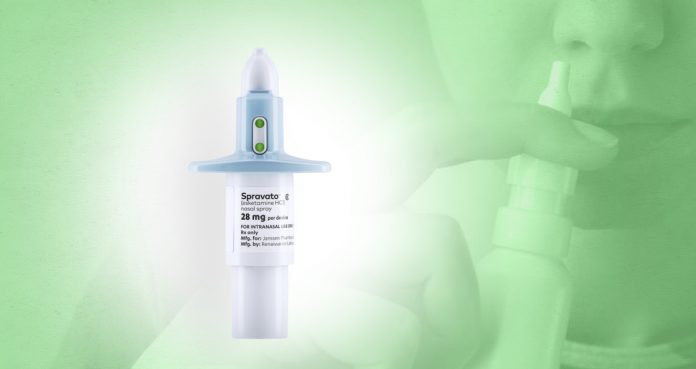Esketamine, sold under the brand name Spravato, has already been found effective at treating the symptoms of severe depression. Now, two new studies have found that the drug alleviates the symptoms of depression in patients who have ‘suicidal’ thoughts.
Available in a nasal spray, esketamine is a close cousin of the party drug and anesthetic ketamine.
On Monday, Janssen Pharmaceuticals, the manufacturer of Spravato, announced that the two large studies conducted on suicidal patients have found that esketamine alleviated the symptoms of depression within hours.
Janssen Pharmaceuticals and Johnson & Johnson sponsored the two studies, which were present at the 32nd conference of European College of Neuropsychopharmacology (ECNP) in Copenhagen.
The studies included more than 450 patients who were known to have suicidal thoughts. Researchers said that patients who received esketamine along with other standard drugs were found to be less depressed than those who received only standard oral drugs.
Interestingly, the researchers found that patients who received esketamine were less suicidal, although they had some depressive symptoms.
In March, the FDA approved
Lead author of the new studies, Dr. David Hough, said, “Esketamine showed a benefit in a very high-risk patient population, which is usually excluded from most clinical trials.”
Dr. Hough explained the company foresees that patients with major depression and suicidal thoughts can take esketamine nasal spray twice a week for at least four weeks in association with oral antidepressants. After that, clinicians may choose to advise the drug to patients who do not respond to oral medications.
“Depression drugs are rarely tested in suicidal patients because of concern that they may harm themselves,” said Dr. Hough. “And that concern proved warranted in the two new studies.”
Dr. Hough continued, “There were some suicide attempts in both treatment arms and there was one completed suicide.”
When esketamine was approved by the FDA in March, the dean of the Icahn School of Medicine at Mount Sinai, Dr. Dennis Charney told NPR, “It was potentially a game-changer for millions of people. Many of them are suicidal. So it’s essentially a deadly disease when you haven’t responded to available treatments.” Dr. Charney helped develop the drug 20 years ago for people who do not respond to oral antidepressants.





















